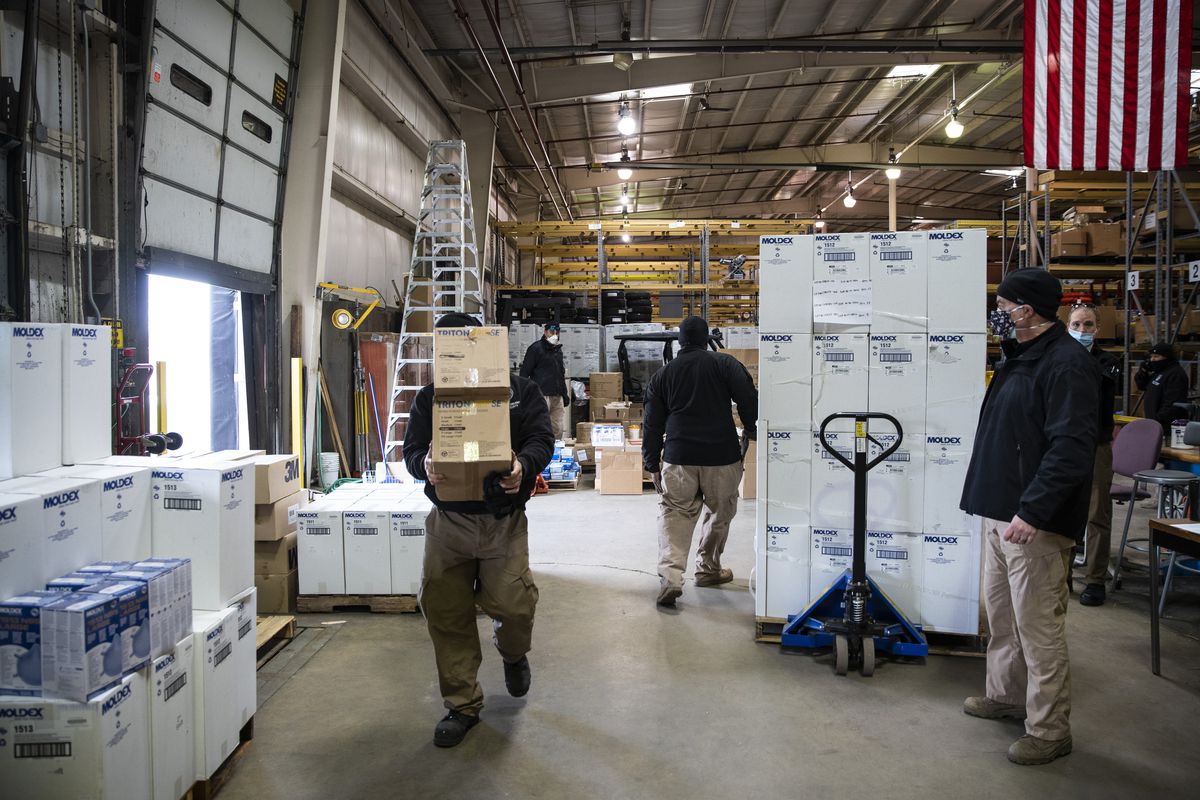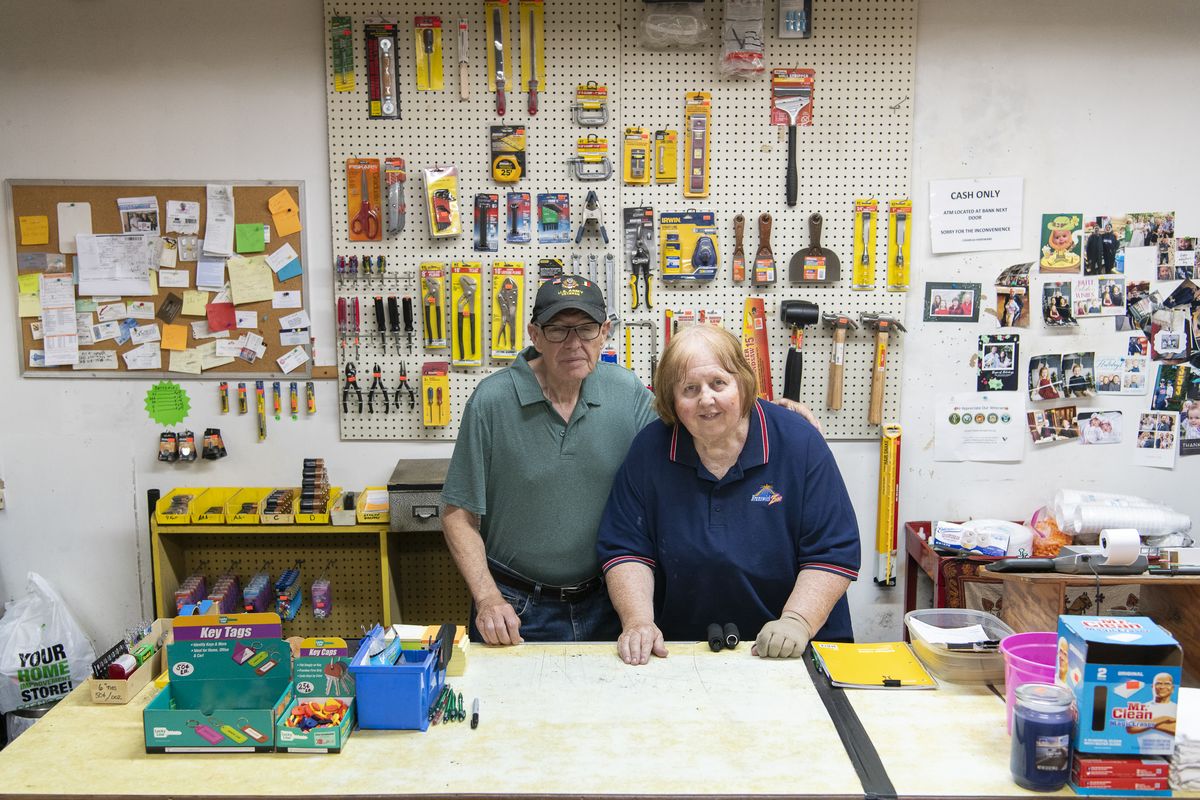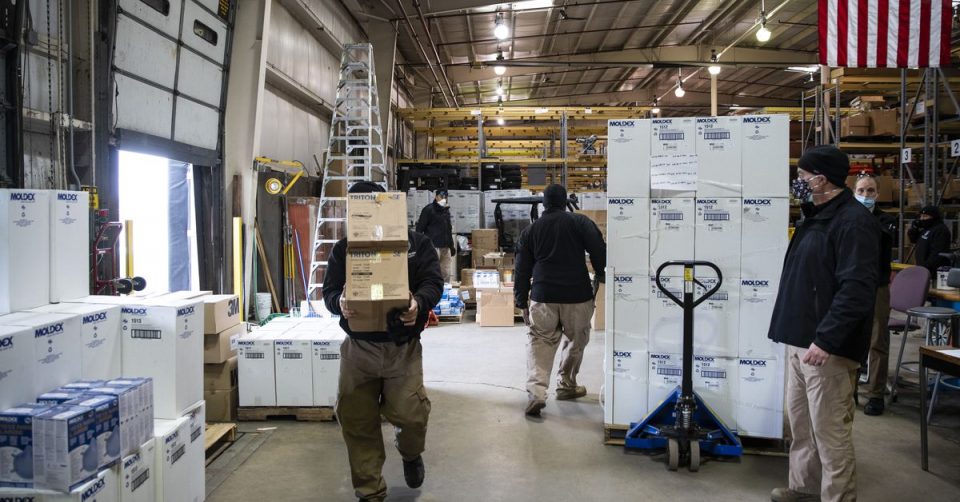The Latest
Wild West competition for face masks has eased; Illinois stockpiling PPE for a second wave

If Illinois experiences a resurgence of COVID-19 later this year, as many expect, state officials say they should be much better prepared from the standpoint of having the necessary medical supplies this time around.
Deputy Gov. Christian Mitchell said the state has stockpiled tens of millions of face masks and other personal protective equipment — gowns, gloves and shields — in anticipation of a possible second wave.
“I feel we are pretty well-positioned at this point,” said Mitchell, who found himself in the eye of the storm in early spring as the governor’s point man on PPE procurement.
Back then — just three months ago, though Mitchell said it feels like three years — I told you about the Wild West world of emergency PPE procurement in which governments competed for equipment to respond to the pandemic.
Not only were states and cities vying with each other, they also were up against our federal government and foreign nations to locate and purchase face masks and other supplies.
Officials ended up bidding up prices as they fought over scarce inventory, much of it located in China, which posed its own complications because of the Trump administration’s antagonistic relationship with the Chinese. Special flights had to be arranged to bring in materials.
It got so crazy at one point that an Illinois state comptroller’s employee drove a $3.5 million check from Springfield to a McDonald’s restaurant in Dwight to hand it off to a Chicago area moving company owner to beat a deadline to close the deal on an order of face masks from China.
“The dust has settled,” said Arnold Park, a Chicago lawyer who shifted his family’s beauty-supply business into medical supplies during the early days of COVID-19 and later landed two state contracts for PPE.
The need for supplies remains. But the urgency has eased, according to Park, whose Alicia International Inc. used its Chinese relationships to make the switch.
Read Mark Brown’s full column here.
News
11:17 a.m. July Fourth weekend will test Americans’ discipline
The U.S. headed into the Fourth of July weekend with many parades and fireworks displays canceled, beaches and bars closed, and health authorities warning that this will be a crucial test of Americans’ self-control that could determine the trajectory of the surging coronavirus outbreak.
With confirmed cases climbing in 40 states, governors have ordered the wearing of masks in public, and families were urged to celebrate their independence at home. Even then, they were told to keep their backyard cookouts small.
Health experts agree this will be a pivotal moment in determining whether the nation slides into a deeper mess. The fear is that a weekend of crowded pool parties, picnics and parades will fuel the surge.
“We’re not going to be arresting people for having gatherings, but we’re certainly going to discourage it,” said Dr. Jeff Duchin, public health director for Seattle and King County.
Those who decide they must gather with a small group of family members need to be careful, he said: “Don’t share utensils, don’t share objects, don’t pass them back and forth, because you’re passing that virus around as well.”
The warnings were sounded after a Memorial Day weekend that saw many people emerge from stay-at-home orders to go to the beach, restaurants and family gatherings. Since then, confirmed infections per day in the U.S. have rocketed to an all-time high, more than doubling.
10:10 a.m. Taylor Street businesses say thanks, but no thanks, to street closures aimed at helping restaurants

Last Friday, Paul and Carole Rinaldi hoped business at their hardware store in Little Italy would finally begin picking back up after months of a state-ordered shutdown and limits on capacities had a harsh financial impact.
When the husband and wife duo arrived around 9 a.m. to open the doors at Chiarugi Hardware at 1412 W. Taylor St., they saw the street was blocked off from Loomis Street to Ashland Avenue. Carole, who has a walking disability, was barely able to make the trek to their storefront.
The hardware store, which has been in business for 65 years, ended up earning just $50 after being open for nine hours that day — and pulled in similar amounts the next two days. That is significantly less than normal, the couple says.
The street blockage is part of a pilot program Mayor Lori Lightfoot announced at the end of May designed to increase foot traffic to restaurant corridors across the city. The idea is to grant eateries the ability to use streets for outdoor dining to help struggling businesses bring in more customers while safely practicing social distancing.
But Chiarugi and some other Taylor Street businesses — including restaurants — say though they realize the street closures were done with good intentions, they are unintentionally having a negative impact.
“We are a hardware store and rely on people coming here with their cars,” Paul Rinaldi said. “We can’t expect for someone to walk a half-mile carrying a bag of concrete, can we?”
Read the full story from Manny Ramos here.
9:23 a.m. City orders quarantine for anyone arriving in Chicago next week from states with COVID-19 surges
Starting next week, anyone arriving in Chicago from a state seeing a surge in new coronavirus cases — whether they’re out-of-state visitors or returning city residents — must quarantine for two weeks under a new public health order issued by Mayor Lori Lightfoot ahead of the Fourth of July holiday weekend.
The order takes effect Monday and applies to any traveler to Chicago from one of 15 states spanning the South and West that have been beset by massive outbreaks in recent weeks, including Alabama, Arkansas, Arizona, California, Florida, Georgia, Idaho, Louisiana, Mississippi, North Carolina, Nevada, South Carolina, Tennessee, Texas, and Utah.
The city says it’ll update that list weekly starting July 14, with states added to the quarantine list if they have an infection rate greater than 15 new COVID-19 cases per 100,000 residents on a weekly rolling average. States will be removed from the list if their rate drops below that threshold.
Read the full report from Mitchell Armentrout and Tom Schuba.
New cases
Analysis & Commentary
12:24 p.m. Let public health data guide path forward on COVID-19
Illinois was hit hard by the initial outbreak of the COVID-19 pandemic, but we’ve been steadily flattening the curve ever since. New cases and hospitalizations have declined far enough for every region to reach phase four of the five-step “Restore Illinois” plan. We should feel proud of our response so far, and proceed into this next phase carefully, to protect the hard-won and easily reversible progress we have made.
Now that shelter-in-place orders have been lifted nationwide, it’s clear the hasty model of reopening has failed to keep people safe. New outbreaks are emerging across the country, with cases rising in over half the states. Even in Illinois, where the trends over the past two months have been positive, new infections and the rate of positive test results have both begun to slightly trend upward again.
That’s why it’s critical that we let public health data and caution continue to guide our path forward. While Illinois has clearly made great progress, the risks remain high for many, including medical and other essential workers, older adults, residents of long-term care facilities, the immunocompromised and communities of color facing disproportionately high infection rates.
Several steps help manage the increase in risk that comes with reopening.
Read the full column from Abraham Scarr here.
9:30 a.m. As a dad in the age of coronavirus, I’m angry at people who won’t wear a mask to protect my kids
I’m angry. Really angry.
For almost four months, we’ve been stuck inside, like prisoners on house arrest. I wash my hands so often that I wonder if I might not have developed a lifelong neurosis. I trek to the grocery store twice a week, face covered, groping among the produce because I can’t stop my glasses from fogging up. We’ve skipped doctor’s appointments for my older boy Lucca — and my own, too — because we just don’t think it’s worth the risk.
Why do we do these things? Our governor and mayor have asked us to stay home.
But also because we know that, despite the deep frustration, staying at home and washing hands frequently actually works.
How can I be so sure? A month or so before the lockdown, I was at the emergency room with Matteo, our 2-year-old. It was his second or third trip there in as many months. Matteo has asthma. His medicine mostly keeps his breathing under control.


